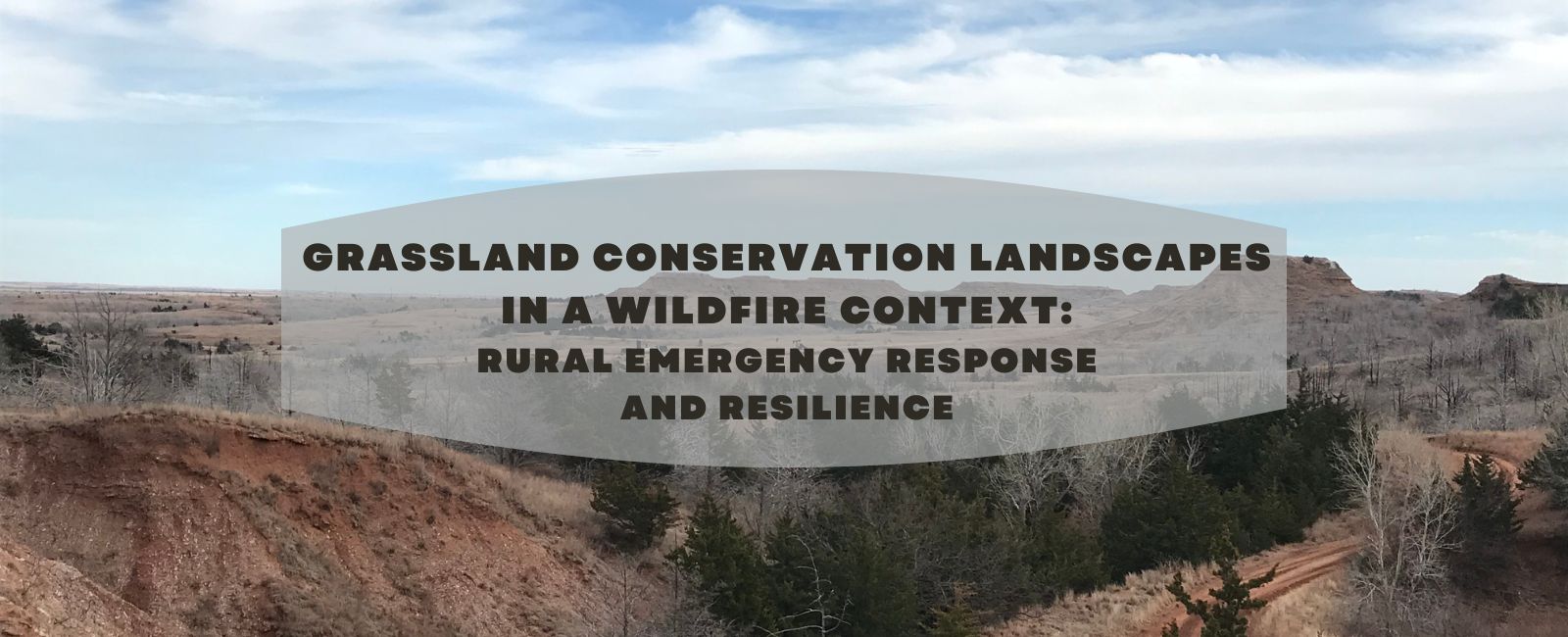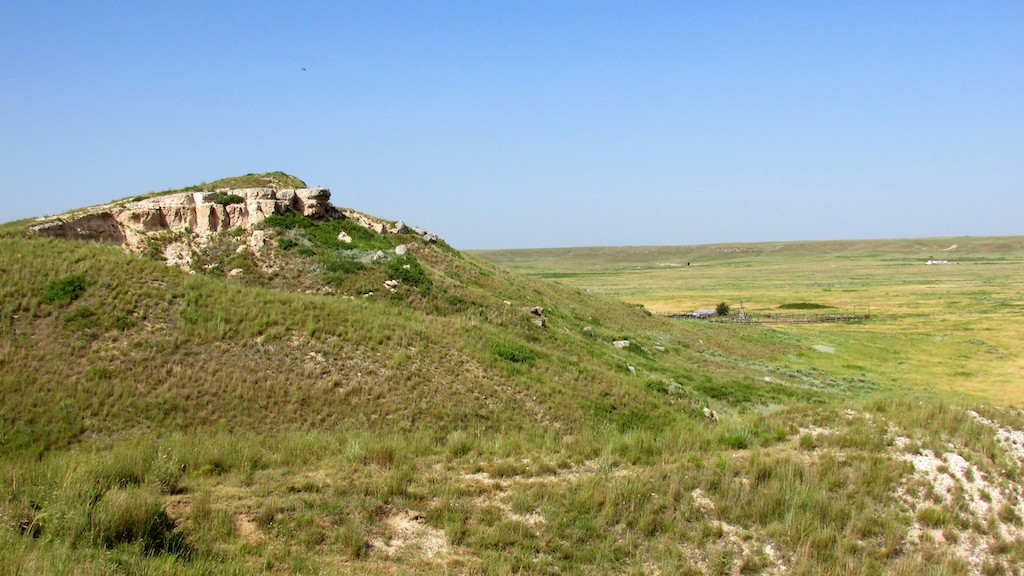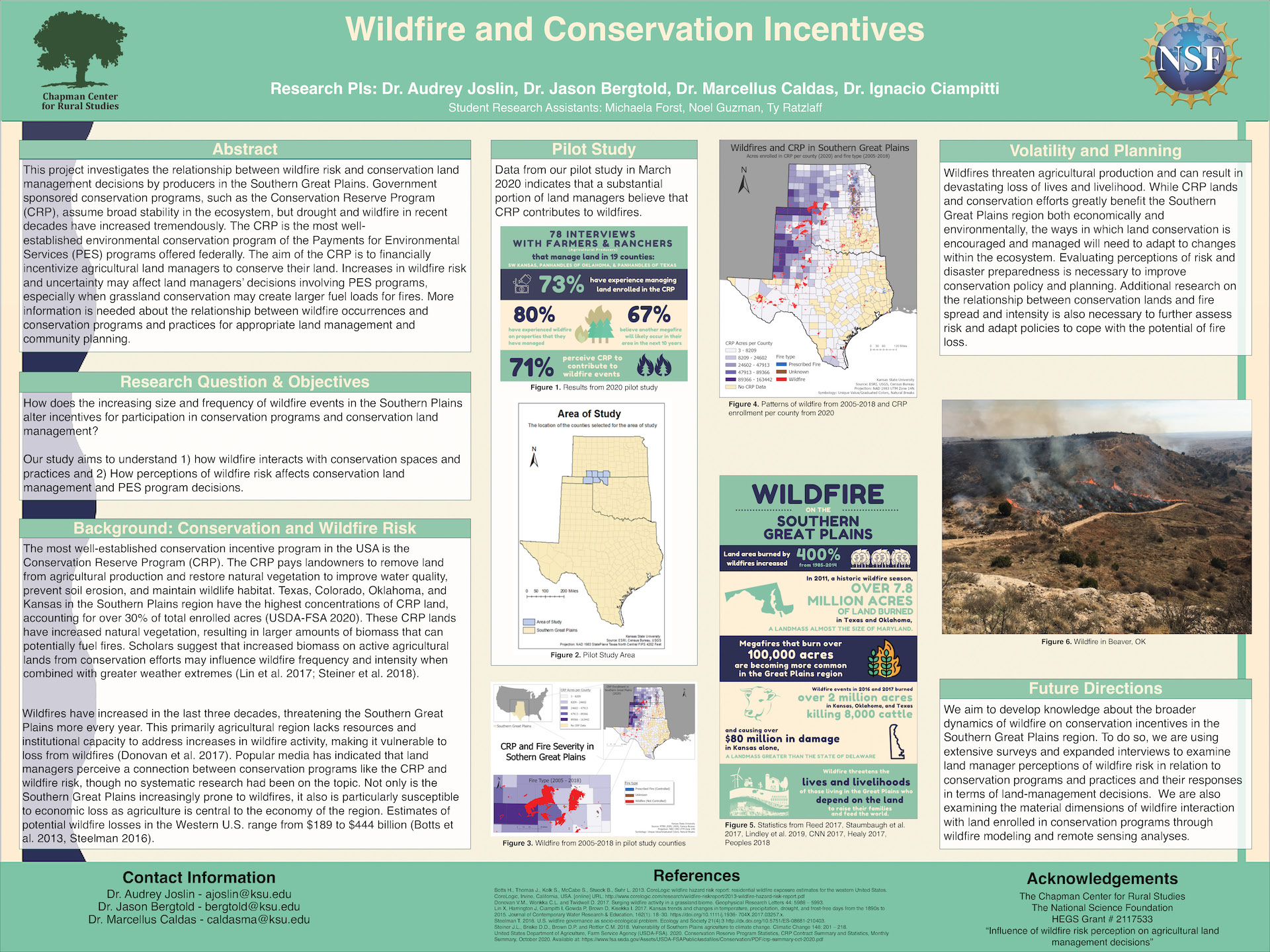
Wildfire, Rural Communities, & Conservation Landscapes
2021 Interdisciplinary Research Grant Project

Wildfires have always been a part of the Great Plains ecosystem. Sparked by lightning, or carefully managed through controlled burns, they are a vital part of our landscape, maintaining the beauty and health of the prairie. But fire is a double-edged sword, both woven into the fabric of the ecosystem and capable of immense destruction. The farmers and caretakers who work to preserve our prairies deftly manage this balance to preserve our land for future generations. Yet, these days it seems that fires are getting larger and more destructive. In the years 2016 and 2017, Kansas alone witnessed the incineration of over 800,000 acres that resulted in losses of infrastructure, crops, and livestock totaling over $80 million dollars. More than ever, the Great Plains is learning to live with the ever-present threat of wildfire.
Our newest IRG project faces the threat of wildfires head on. Drs. Joslin, Bergtold, and Caldas recognize the resilience of rural communities who face increased wildfire threats and tirelessly work to conserve grasslands and agricultural lands, such as through participation in the Conservation Reserve Program (CRP). USDA programs such as the CRP incentivize land preservation to help protect water sheds, maintain soil quality, and protect wildlife habitats. How will these stewards of the land face the challenge of more frequent and more intense fires?
This collaboration will interview emergency workers and response networks from throughout Southwest Kansas and the panhandles of Oklahoma to identify what local communities are doing to take on the ever-growing challenge of fires. By assessing decision-making dynamics and emergency response networks, this project will raise awareness of evolving strategies toward maintaining land stewardship and emergency response in the face of more extreme weather. We hope this work will improve our understanding of the relationship between land preservation and wildfires, as well as improve responses to this growing threat.
IRG recipients receive up to $15,000 to encourage faculty to work creatively and collaboratively with scholars outside their specializations to generate new insights into the dynamics of rural life through partnerships with rural Kansas communities or with the potential to improve the quality of life for rural Kansas residents. This project embodies this mission as it unites methods from Geography and Geospatial Sciences with Agricultural Economics to consider the real threat of larger and more frequent wildfires. Undergraduate researchers will be involved at each stage, learning both quantitative and qualitative research methods, traveling to field sites, and communicating findings. This project will continue to build links between K-State research and rural Kansas communities as the research team will work closely with stakeholders in eight Great Plains counties. Drs. Joslin, Bergtold, and Caldas have an impressive track record of working alongside communities in their research, work which we plan to feature as they prepare for this newest stage of their project.

Dr. Audrey Joslin is an Assistant Professor in the Department of Geography and Geospatial Sciences. She joined Kansas State University in 2016 after earning her doctorate from Texas A&M University. Her research explores the interactions between nature and society, emphasizing environmental governance and the socio-political dimensions of conservation programs. Using qualitative and mixed methods approaches, she engages questions about environmental change and sustainable development. Her recent work particularly focuses on the outcomes of incentive-based conservation in grassland ecosystems and includes projects in the Andes mountains as well as the Great Plains. In addition to her scholarship, Dr. Joslin teaches innovative courses and mentors students at both the undergraduate and graduate levels.
Dr. Jason Bergtold is Professor in the Department of Agricultural Economics. He earned his PhD in 2004 from Virginia Tech. Prior to coming to KSU, he was an Agricultural Economist with USDA-ARS working in the area of conservation agriculture. He came to KSU in 2008. Since here, he has developed a stong applied and interdisciplinary program in conservation in agricultural landscapes, land use economics, bioenergy, and applied quantitative methods. Dr. Bergtold has published numerous research articles in these fields and received numerous grants from USDA-NIFA, NSF and other organizations for his research. He is a recognized teaching scholar and teaches classes at both the undergraduate and graduate levels.
Dr. Marcellus Caldas has a PhD from University of São Paulo College of Agriculture (Brazil), a PhD from Michigan State University, and a Post-Doctoral training in the Center for International Development at Kennedy School of Government, Harvard University. He has significant international experience and a history of teaching, research and administrative experiences. Caldas is an Economic/Environmental Geographer, with strong training in statistics and economics. His research agenda has been on land use and land cover change processes, especially tropical deforestation in Latin America, and conservation. His research brings a geospatial analyze to nature-society relation and focus on processes of environmental change by integrating remote sensing, spatial statistics, and ethnographic field data into studies of land use and cover change processes.
